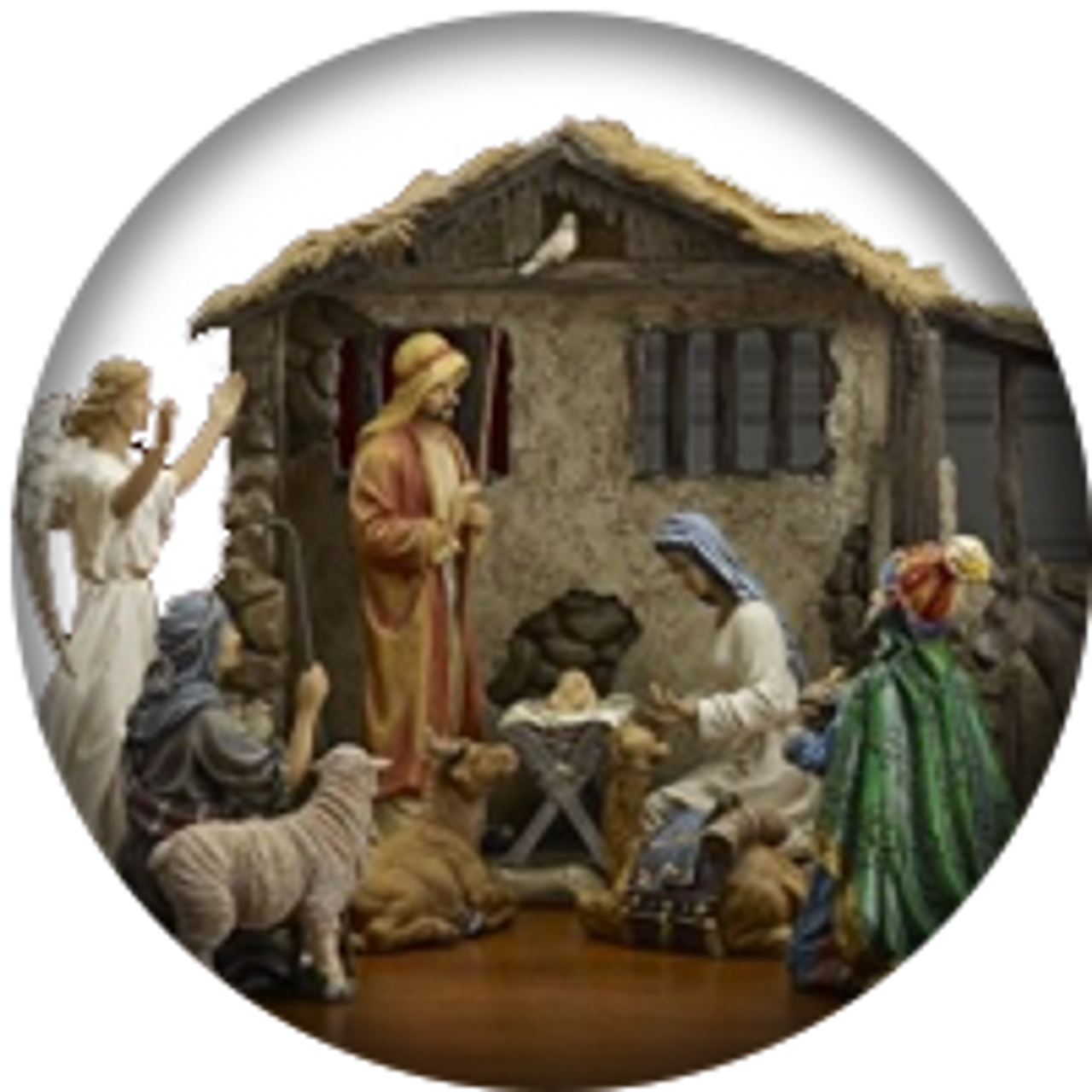ST. JOHN OF THE CROSS: PASSIONATE LOVE Applied to Modern Life
Kathy Boh on 12th Dec 2019
ST. JOHN OF THE CROSS:
PASSIONATE LOVE
Applied to Modern Life
We hear a lot about “change” these days. It is often connected to the concept of “progress”. St. John of the Cross would have us ask, “What are we moving forward toward? What are our hearts seeking most?” Let’s take a brief look at his life.
INTRODUCTION: THREE SAINTS, PASSIONATE LOVE
There is no doubt that the saints hold a very particular place in God's heart (and ours)—even the ones that are not canonized, for God sees what is not so easily apparent to our superficial eyesight. Some saints, however, bring a special focus to our walk with the Lord. We highlighted three a few years ago in the fall of 2015—St. Therese Lisieux, St. Francis of Assisi, and St. John of the Cross.
So before we visit St. John, we will present the "Introduction" to these saints.
In our modern, fragmented, complicated world we often hear the word “simplicity”. It comes as a breath of fresh air, a fond wish, a hope-filled promise of a less stress-filled life. Although the speedy and all-encompassing “magic bullets” we long for are, realistically, rarely found, there still remain some timeless simple truths that pack a punch. Can we really find the core of those truths?
Solomon penned the words, “There’s nothing new under the sun.” We see that in fashion—it re-cycles every other (or every few) decades—and in history and philosophy, where “new” ideas can be found in earlier decades, centuries, and even millennia. This even applies to architectural feats from thousands of years ago that—as of yet— we (modern, intelligent, engineering minds) cannot replicate nor quite comprehend. We “moderns” may need to take a step back, then, from certain conclusions. Although advances in technology are unmatchable. Still--as basic human beings, we are not in a higher state. Jesus made it clear that only God can make us new creations. That would include our “it has to be new to be worthwhile” mindset and our “we’re more advanced and intelligent than any other era in history” questionable conclusion. That might mean that even those from previous centuries may have highly applicable wisdom that pertains to our 21st century lives.
Are we (like Elijah, weary from the dangers and stresses of spiritual and real battles) really hungry enough to find answers that work deeply in our lives? Are we really, honestly looking for doorways to “progress” that come with the awesome power of the “still, small voice” of God, rather than continually requiring the Technicolor, 3-D excitement of the earthquake, the fire, or the rock-crushing wind?
If so, we may want to take another look at the inspiring passion of some saints that had a bulls-eye focus on the core of it all—love—Love Himself, and what He gives and leads in regard to love. Three particular saints found the intensity, the enormity, and the delightful, gentle joy of such surrendered lives and such direct, targeted seeking. They are St. Therese Lisieux, St. John of the Cross, and St. Francis Assisi.
Jesus, Himself, said that in later times, before He comes again, “the love of many would grow cold”. [Mt 24:12].
No matter what time it is on the eternal clock, love (agape love) matters. In these saints’ lives, we can see many manifestations of love: love toward God, love humbly received from God, and love generously given to others—even amid struggles, pain and adverse circumstances. Let’s take a look, this time, at St. John of the Cross.
ST. JOHN OF THE CROSS
1542-1591
Feast Day December 14th
John was born in Avila, Spain to a father (from a wealthy family of silk merchants) who married his mother (who was from a poor family) out of love alone. This strong, dedicated love, along with his mother’s devotion to helping others (despite her own and her family’s struggles to survive after his father’s early death) was a tangible and loving example for John. It was a solid foundation for the deep well of love and devotion toward God and others that he exhibited throughout his 49 years.
St. John of the Cross enjoyed the presence of God in solitude, and drew very close to God. He is called a “mystic” by many, but this term by no means describes the fullness of his life.
His perspective was not merely one of an ascetic way of living. Instead, his life shows us a man with a compassionate heart for helping others, getting his hands dirty, and desiring to inspire others to a closer walk with our Lord. He was a bit of a “jack of all trades”, and did much physical labor, in addition to all his writing and leadership roles. He influenced others both inside and outside of his Carmelite (reformed) order.
John’s writing (including poetry) was intended to inspire those whom he cared for—to give them a deeper hunger and love for God. Rather than give an intellectual or 'theological' treatise in his writings, he wrote from a desire to stir the hearts of others toward their Lord, Creator and Maker. Consequently, much of his writing was intended to be more artistic, motivational, and inspirational.
Some of his family (mother, brother and sister-in-law) continued to be part of his life, living adjacent to his monastery even after his entry into the Carmelite order with his religious brothers. The order was undergoing reform as he and his close friend, St. Teresa of Avila, worked together to bring the order back to its original rules and dedication. Teresa especially believed that a focus on a simpler, more spiritual life—embracing and encouraging poverty and solitude— were important characteristics of religious life in communities. The two were many years apart in age (she was 27 years older than he), but they shared many similar ideals and a great mutual respect. He became her spiritual director, and was the first Prior of the (Discalced) Carmelite Friars in Duruelo.
St. John ended up founding 7 monasteries and influenced many—even helping in monastery construction, making bricks, and assisting the needy in nearby towns. Although he was at the heart of the reformed Carmelite movement, he worked hard to stay out of the in-fighting. Nevertheless, he was made to suffer betrayal and incarceration at the hands of those who preferred to see him completely stopped. (His imprisonment included flogging and starvation.)
Eventually, the “Discalced” (“barefoot” /reformed communities) received official permission for their renewed lifestyle and rules. Along with the new orders also came a new and different assigned province. Even this, however, did not completely eliminate the dissension. He eventually faced renewed resistance, with even more betrayal and suffering immediately prior to his death (from an infected leg wound received previously during his imprisonment).
OUR HEARTS IN UNION WITH GOD
Earlier, we asked, “What are our hearts seeking most?” That question jumps us straight into a no-holds-barred look at some tough questions: What does our own “religious” life like?
~~Is it simply a “religious”, non-integrated compartment of our lives? Or is it knitted and melted, kneaded and dissolved into the rest of our life and being that seeks to love God first and seeks to love and forgive others?
~~Is it simply a well-oiled machine that looks good on the outside—to ourselves and/or to others—or does it involve our deepest desires, our 1st-choice love and preferences, and our deepest commitments?
St. John wrestled with “status quo” religious life. He worked to transform it into a life of deeper devotion and true transformation, for himself and for others outside of monastery-type religious life—especially lay persons in towns around his locale.
John describes, with intensity, many points along the path to deeper union with God.
Although the full practice of his journey may be more suited to religious communities, his understanding and descriptions of what a soul goes through in seeking God’s presence, closeness, and His pleasure—especially initially—are both enlightening and encouraging. They are intended to help lay people as well.
Several statements may help encapsulate the heart of what John of the Cross discovered.
Jesus chose on earth to desire to please His Father and to do His will above anything else. He even called His Father’s pleasure His “meat and His food”1.
John showed that we need to seriously reject those pleasures of our senses and natural nature that keep us from moving in God’s direction, or that are clearly not intended for His honor or glory. So he says to renounce and completely reject these things contrary to our focus on giving glory to God.
The focus is on what helps our walk with the Lord God, or, at least, does not draw us away. God created and acknowledges our humanness in every good sense. Therefore, our senses and needs and pleasures are not—in themselves—a barrier to God’s leading or presence. They just easily can be used by the enemy to lead us astray if we are not leading a surrendered and focused life focused on God.
Some would say that John’s call is severe by modern standards. But let's go deeper in comprehending his purpose, and, then come to a better understanding from a modern perspective. Perhaps we would temper some ideas by looking at motivation and priorities, and specific occasions where denial of temporary pleasure is appropriate—without eliminating the celebration and well-chosen feasting times in life. (It was Jesus Himself Who chose to work His first miracle at a wedding feast at Cana--turning water into wine. It is the bible that talks about the feast at the wedding supper of the Bride and the Lamb.)
So—we ask the question: Can we embrace St. John's wisdom and still live life in our modern world?
The short answer is a resounding, “YES!”
Again, we get back to "focus" and major direction and priorities in life— "what matters most": His plan, His purpose, His glory. We know that God will enable us to be energized by grace to do whatever He calls us to do. And He will never let go of us.
There are certainly times when the “pleasures of our senses and natural nature” can “keep us from moving God’s direction” or are “not intended for his honor or glory”, (to quote from St. John. See footnotes).
Then, there are other times when these pleasures are a blessing from God and pleasing to God. God, Himself, created us and our human natures—and called it “good”. In creating us, He said that we are even created "in His image." We simply need to continually allow Him to direct us and to sift our choices so that what we choose supports His purposes and plans for our lives, and keep us living in, for and through Him—the Way, the Truth and the Life.
THE DARK NIGHT OF THE SOUL
The dark night of the soul refers to a “dark” time in our lives—whether chosen indirectly or brought on by circumstances beyond our control. Sometimes the darkness is felt as “side-effects” of commitments and choices made for the Lord—as we seek to follow Him.
We will describe what that means as clearly as we can. The process of complete (or almost complete) denial of human pleasure (to the human mind in ‘understanding’ or to the human emotions or bodily senses in some form of ‘enjoyment’ [writer’s explanation] ) then becomes a “dark night” for our senses (or for our minds, or for our emotions). If we embrace these things as a part of our journey, and subdue our wills as we continue to choose the Lord above all else, we can find a measure of delight we have not known—even a deep and true joy in the Lord.
This, we need to pray about and mull over, and ask for Holy Spirit wisdom and grace… much grace as we continue to pray and ask God’s help and guidance. The Holy Spirit wants to graciously gives us this wisdom and grace as He forms His fruit in us. And there are proper times when God wants to free us from oppressive spirits that are not part of His kingdom plan for us.
John of the Cross speaks concerning the heart, mind and will regarding motivations, desires, and deliberate choices. True holiness deeply involves these things—though superficial religiosity can find ways to ‘paint over’ or gloss over these core aspects of true integrity and holiness. True integrity goes much deeper than 'feeling holy' or 'looking holy' to others.
John gets specific regarding what needs to be re-formed by the Lord’s action in us (made possible by conscious choices we make), so that we can come into a closer union with the Lord. Faith, he says “deprives us of …information and knowledge…” acquired “by the light of understanding”—[by the senses, or even reasoned by our rational faculties]. Faith… transcends. So Isaiah said: ‘If you do not believe’ [i.e., what you cannot see or sense], ‘you will not understand…’” 2
So, while “faith” operates without full knowledge or sensory or intellectual “proof”, it [faith] is still necessary (almost as a type of “door”) to understand or receive Who God is and what He has to give us. It is “good news”, however, to know that He does not leave us helpless or completely on our own in believing. We find out that He says in scripture that He will give us “a measure of faith”. …”Think soberly (with sober judgment), each according to the measure of faith which God has apportioned (assigned) him.” [Rom 12:3] And Jesus told us that if we “have faith the size of a [tiny] mustard seed, you will say to this mountain, ‘Move from here to there’ and it will move. Nothing will be impossible to you.” [Matt 17:20]
Without faith, we would not “understand” the things God would have us know and hear and follow. Faith is more involved in a vibrant life close to God than most of us realize. Drawing nearer to God and receiving, following and obeying His word and directives involves continuous exercise of faith. But it is a faith that God will tend and help grow within us as we seek Him and cooperate with Him.
"Faith" includes trusting Who God is and what He has said in scripture—which forms the primary basis of what we believe as we choose to seek and follow Him. He reveals Himself through His word that we come to know and receive deeply into our hearts and spirits, minds and lives. His greatest "revelation" is the Word (Jesus) Who became flesh in that stable in Bethlehem. Jesus is the visible, living, real representation of the Father. Scripture reveals and confirms all of this.
John of the Cross refers to scriptures and bible stories, and to private revelations and divine communications. He gives direction concerning these things. The decisions and actions he calls us to make are aimed at coming to the place where we prefer God above all things, in every way and at all times. That is not to say that we do not all “sin and fall short of the glory of God” at times. 3 God’s mercy is great. He will hold and nurture a heart and a life that honestly seeks Him.
MODERN LIFE APPLICATIONS
It is true that the realities and stresses of our modern lives can be mind-blowing. As we face these realities head-on, John would encourage us to find a continuing cycle of deliberate moments of enjoying God’s creation; of drawing near to Him in quiet; of receiving God’s many blessings by choosing gratitude (even in our dark nights); and getting to know this mighty, awesome, loving God of ours. Then we can let the cycle become a circle that flows out to others, as God leads us.
Somehow, St. John of the Cross discovered the deep and steady character of God, no matter what was happening in his life. John found God’s presence and direction both in His clear, peaceful communication, heart to heart with God, and also in events that were surprising, shocking, and even devastating to him. In seeking God—no matter what happened—it seemed that he found His Beloved Lord even more dear, and in closer fellowship, in his “dark night” experiences, especially in betrayal and imprisonment.
Sometimes, when we are besieged by troubles and troubling relationships, the best news (as human nature tends to think) we can hear in these tough situations is: “He (the other person) had a change of heart”. John lets us see that it is our own hearts that need attention first. It seems that we are conditioned by our culture to desire and expect answers to be 'complicated' but, hopefully, 'easy' to carry out.
John offers us something sort of opposite: ‘simple’, but not ‘easy’. He gives us the simple but profound exhortation to love—God first, and then others, as God leads and graces us. Like his namesake, the original apostle John, he, too, is an apostle of love—loving deeply and passionately, from his own heart, and letting God love him. John’s love shows in his extraordinary personal relationship with God, in his continual tough personal choices, in his many deeds, in his poetic words, and in his exquisite instructions to encourage others in seeking God.
Consider taking some time with St. John of the Cross. Resist the mistaken advice to put him high on a shelf with ‘out-of-reach’ or ‘impossible to follow’ ascetics and mystics. His words and life both apply, in some way, to all of us who seek a true connection with our living and loving God. When John was on earth, he loved to encourage and inspire those around him toward his Beloved Lord. We can let St. John, likewise, inspire us. Which of us doesn’t need more love in our lives?
Check out our upcoming blogs for the Christmas season.
Upcoming articles include parts of our series:
CHRISTMAS TIME: THE GIFT-GIVING SEASON
Part I: THE ORIGINAL and REAL SANTA: ST NICHOLAS (previous blog)
Part II: CHRIST AT CHRISTMAS: THE GREATEST GIFT EVER GIVEN
Part III: FEAST OF THE THREE KINGS—EPIPHANY
This article is based on four articles posted on this blog site, trinitychurchsupply.com/blog, by Kathy Boh. Two were posted in the fall of 2015, and one published in December of 2017 and 2018.
FOOTNOTES:
1 Jn. 4:34
2 Several sources were used, along with general information available. The quotes are from the book:
THE ASCENT OF MOUNT CARMEL, edited and modernized by Henry L. Carrigan, Jr., Paraclete Press, 2002, Brewster MA, p. 47
3 Rom. 3:23










